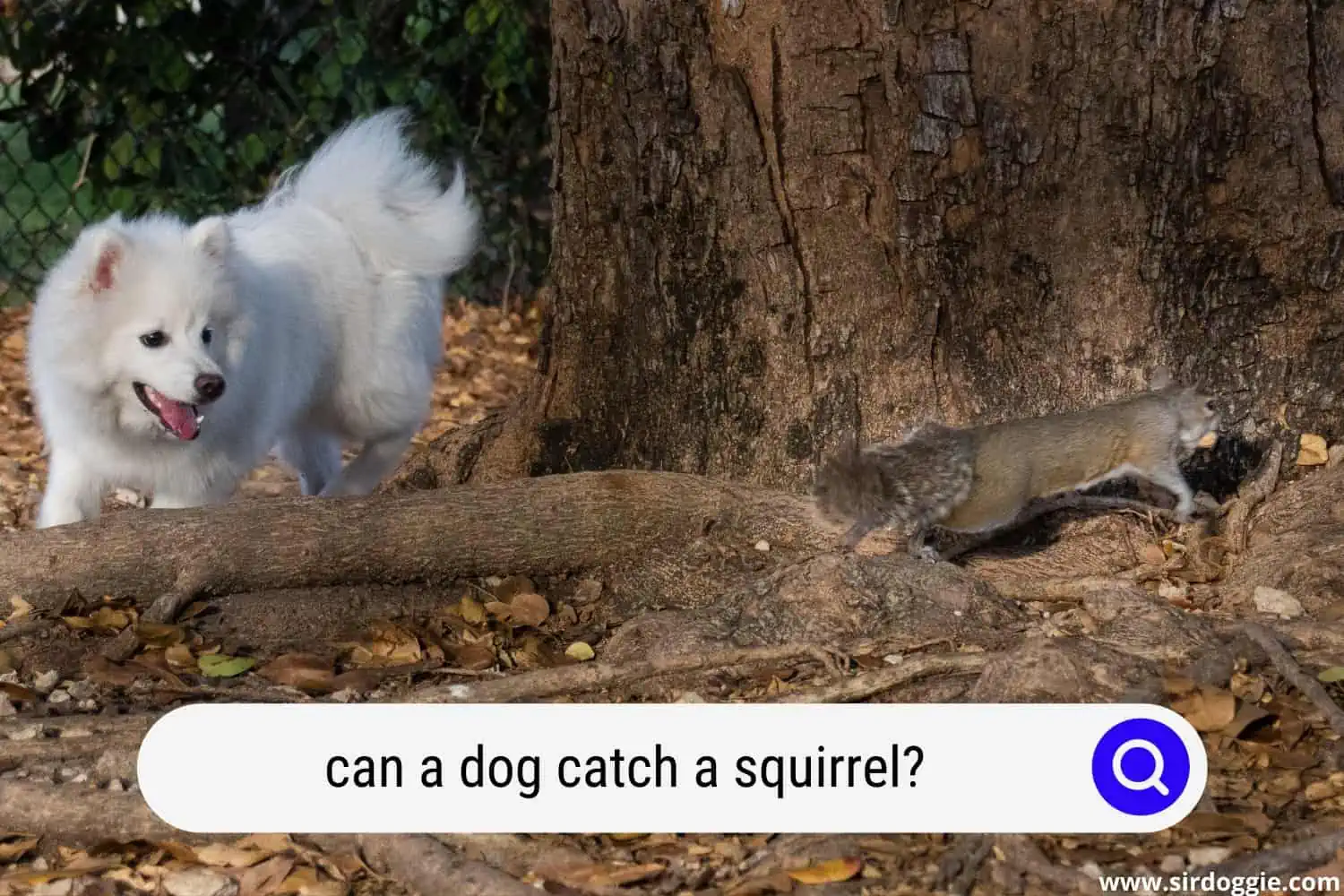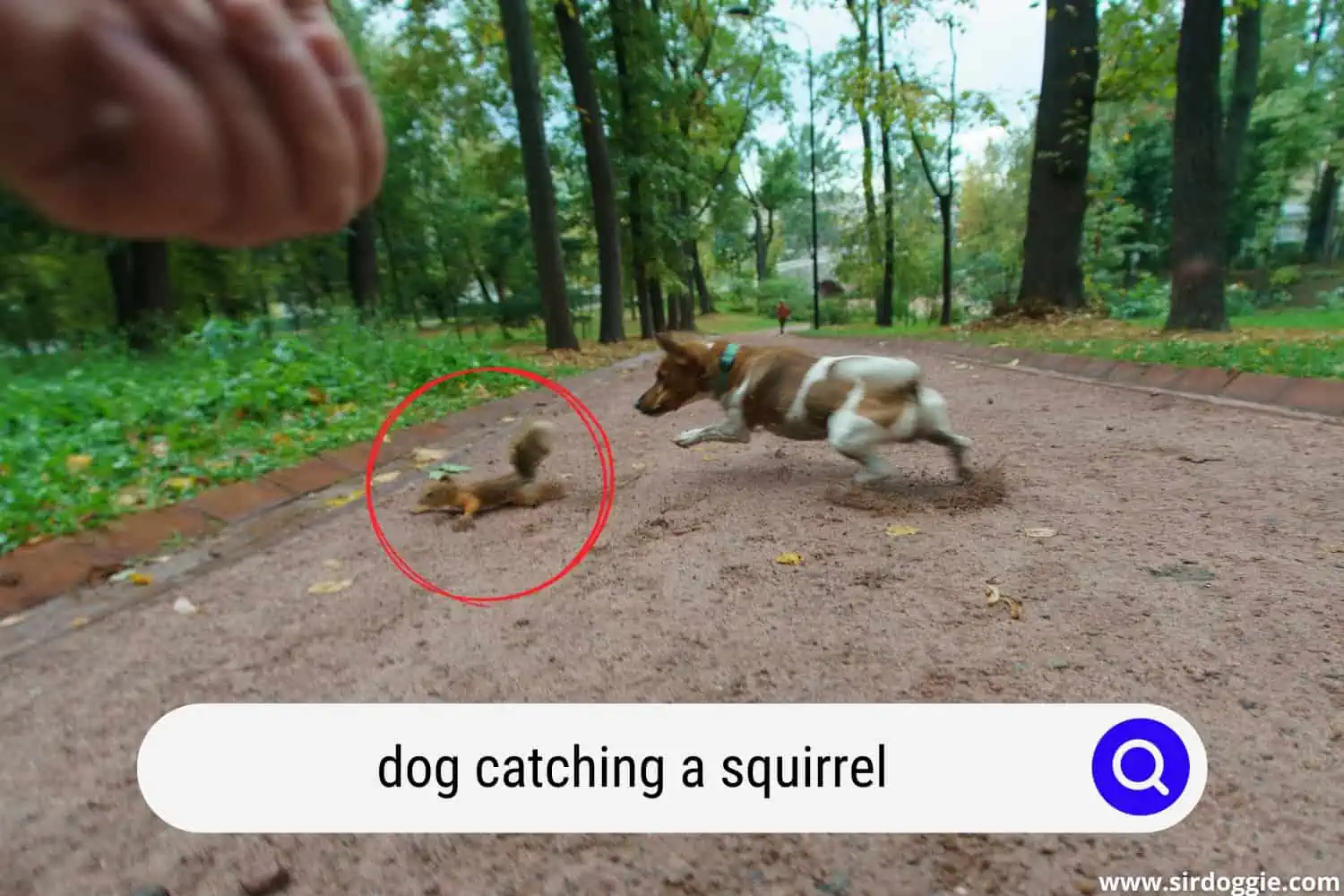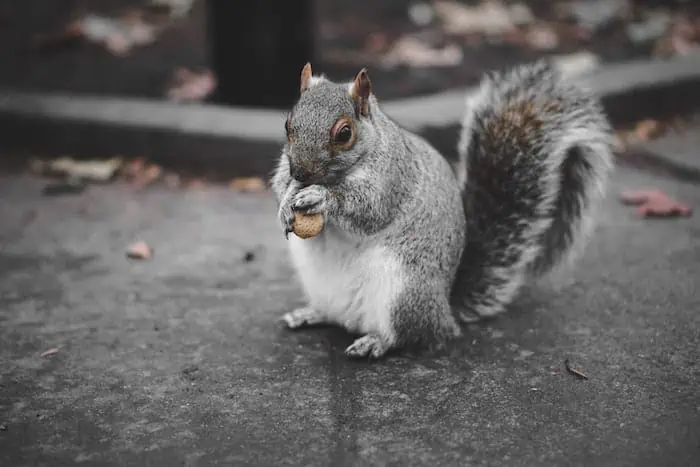Can a Dog Catch a Squirrel? (Here’s The Answer)
We’ve all seen it. A small rodent or squirrel goes running across the backyard, and your dog takes up the chase. Dogs love to chase squirrels, and most of the time, the fun is in the chase itself.
Dogs chase squirrels, but can a dog catch a squirrel? Yes, dogs can catch squirrels. Dogs with high prey drive chase them to catch them, and while we don’t like to think about it, they will kill them. Whether your dog chases squirrels for fun or to catch and kill them depends on the type of dog you have.
Seeing your furry friend catch a squirrel can be unnerving, but the truth is that dogs are pretty animals. Their wild counterparts survive by hunting smaller animals. Is there a way you can stop your dog from chasing squirrels? Why do they do it in the first place? What do you do if your dog catches one?

Why do dogs chase squirrels?
Dogs with instinctive hunting or prey drive commonly chase squirrels. They pick up the squirrel’s scent, and it’s all over. Their primal instincts kick in, and there’s no calling them back. It’s extremely challenging for a dog to overcome its instinctive reactions, but that doesn’t mean it’s impossible.
Dog’s brains are wired to respond when a prey animal runs away. This is why they chase. Their keen sense of smell drives this behavior, and there’s very little we can do to stop it. A dog’s sense of smell is incredibly powerful, and they have a large olfactory center in their brain that “remembers” smells. If you pay close attention, a dog will chase squirrels more frequently if they’ve done it before. This is because the olfactory center in your dog’s brain has stored the smell of the squirrel, and your dog recognizes that the squirrel is chase-worthy.
Can I stop my dog from chasing squirrels?
Since squirrel-chasing behavior is instinctive, it can be very challenging to correct. It’s best to start with your dog on a leash away from squirrels. As your dog improves in his obedience, you can move closer to the squirrels. The goal is to keep your dog focused more on you than he is focused on the squirrels. If you have a dog with a high prey drive, it may require assistance from an animal behaviorist to change.

Redirecting the behavior
Since your dog’s instincts mean he will always be distracted by squirrels, you can prevent him from actually catching the squirrel by understanding the sequence of behaviors involved. As a rule, squirrel chasing always follows the natural predator sequence of search, stalk, chase, and grab. If you can recognize when your dog is in the initial stages of this sequence and run interference, you can stop it before the chase begins. When your dog begins to sniff out a squirrel, intercept it by distracting him. Noise is usually the most successful in drawing a dog’s attention away from its prey. Try a tin can filled with coins or a loud whistle that can’t be ignored.
A dog’s prey drive can bring you great joy and companionship through tracking. Sometimes dogs chase wildlife because their instincts are not being sufficiently utilized in their daily lives. Much like a working border collie becomes a troublesome dog without releasing his herding instincts, scent hounds and hunting dogs will also seek ways to use their natural abilities if you don’t provide an outlet.
Rewarding your dog for exhibiting behaviors that he was bred to do can be great fun and prevent him from exhibiting unwanted behaviors. You can play scent games in your house or backyard, starting with hiding bits of food and having your dog search them out. Using a command like “find it” can teach your dog to “search” for things by smell. As he gets better at it, hide the treats in more difficult-to-find places.
Some dogs will always require management of their squirrel-chasing behaviors, meaning you will have to keep them leashed when walking in areas where squirrels are likely to be present.
Will my dog get sick if he catches a squirrel?

If your dog catches a squirrel, the odds of him getting sick from it are extremely low. The only real risk is if the squirrel bites your dog, which can cause an infection if left untreated. Squirrels don’t carry rabies, but since your squirrel-chasing dog probably chases other small rodents, too, it’s still a good idea for your dog to be vaccinated against it.
Surprisingly, squirrels don’t carry fleas, but they can carry ticks that will transfer to your dog. Ticks carry a risk of Lyme disease. Your dog, however, is just as likely to encounter these Lyme disease-carrying ticks when running through tall grass or playing in the bush.
What do I do if my dog catches a squirrel?
If your dog catches a squirrel, remember he is doing what his instincts tell him to. Assuming he has killed the squirrel, be careful about taking the dead rodent away from your dog. Dogs can be very possessive about their kills, so proceed with caution if you haven’t experienced this before.
If your dog is lying on top of or “guarding” the squirrel, leave him alone. Most dogs will leave it alone or bury it after a short period. If you must deal with it immediately, separate your dog. Don’t physically intervene with your dog, as a dog guarding its prey is at risk of acting aggressively.
Don’t punish your dog; he didn’t do anything wrong. He did his job. Just because you don’t want to think about your cuddly dog killing small rodents doesn’t mean he’s exhibiting bad behavior. He’s doing what he was bred to do. Prey drive is not a show of aggressive behavior, so make sure you don’t treat it as such.

Family Dog Expert Author
Hi there! I’m Stuart, a devoted dog lover and family dog expert with over a decade of experience working with our furry companions. My passion for dogs drives me to share my knowledge and expertise, helping families build strong, loving bonds with their four-legged friends. When I’m not writing for SirDoggie, you’ll find me hiking, playing with my beautiful dog, or studying music.